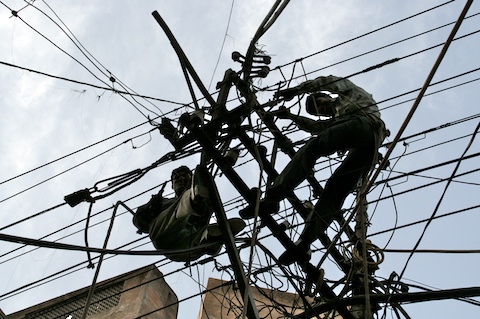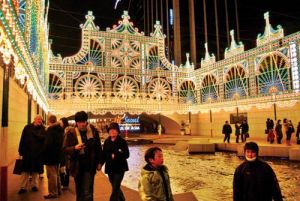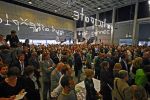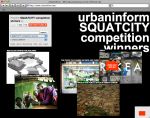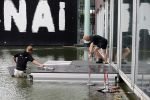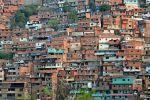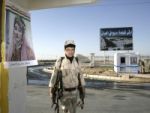Th 10 Dec 09
Open City Lecture and Debate
Lecture by Erik Swyngedouw with an introduction on this week's theme Segregation. The lecture will be followed by a public debate, moderated JaapJan Berg.
“Well, my dear Adeimantus, what is the nature of tyranny? It’s obvious, I suppose, that it arises out of democracy” (Plato, The Republic)
The polis is dead. Long live the creative city! Cities as spectacular phantasmagoric assemblages and heterogeneously disjointed collages of amalgamated techno-natural configurations constitute, according to authors as diverse as Saskia Sassen, David Harvey, Manuel Castells, Maria Kaika, Rem Koolhaas, or Richard Florida, the condensed materialization of a global cosmopolitan order, the apex of the 21st century condition, and the hubs of rhizomatic worldwide networks. They have become the diverse, heterotopian, and ‘glocal’ sites that harbour all manner of possibilities and emancipatory promises, while expressing often the most radical and oppressive forms of exclusion and uneven development. This century will be, much more than the previous one, the century of the city; cities that no longer have an outside, a border. No matter how far one travels, as in Calvino’s Penthesilea, one will never be able to leave the city.
Ironically, of course, while the city is alive and thriving (at least in some of its spaces), the polis, conceived in the traditional Greek sense of the site of public political encounter and negotiation, the spacing of (often radical) dissent, disagreement and dissensus, the space where political subjectivization literally takes place, seems moribund. Both the cosmopolitan cynics of a latter-day self-styled leftist persuasion for whom the only form of politics resides in a deconstructionist critique of the impossibility of a genuine radical politics and who embrace a neo-liberal cosmopolitan identity politics while clinging to the privileges their institutionalized urban settings generously provide on the one hand as well as the neo-liberal elites that assert the impossibility of an urban world different from the one they created in their own image on the other have radically evacuated proper politics from the urban, reducing the polis to a mere city.
This figure of the Post-Political City will be leitmotiv of this contribution. Taking our cue from Jacques Rancière, Slavoj Žižek, Chantal Mouffe, Mustafa Dikeç, Alain Badiou and assorted other critics of the cynical radicalism that has rendered critical theory and radical political praxis impotent and infertile in the face of the rapidly de-politicising gestures that pass for urban policy and politics in the contemporary neo-liberalising police order, we shall attempt to re-centre the political in contemporary debates on the urban. While taking the environment as our point of entry, we shall develop the argument in four steps. The first part recovers the notion of the political and of the political polis from the debris of contemporary obsessions with governing, management, and urban polic(y)ing. A theoretical, yet eminently practical, position of what constitutes a proper urban political space will be enunciated. In the second section, the depoliticised condition of the late capitalist urban will be explored, arguing that the urban frame has been thoroughly, and perhaps fatally, infested by an ordering that is thoroughly post-political and post-democratic.
This evacuation of the political from the plane of immanence that defines the very possibility of the polis and the concomitant consolidation of an urban post-political arrangement runs, so we argue, parallel to the rise of a neo-liberal governmentality that has replaced debate, disagreement and dissensus with a series of technologies of governing that fuse around consensus, agreement, and technocratic environmental management. In the third part, we maintain that this post-political consensual police order revolves decidedly around embracing a populist gesture, one that annuls democracy and must, of necessity, lead to an ultra-politics of violent disavowal, radical closure and, ultimately, to the tyrannies of violence and of foreclosure of any real spaces of engagement.
However, the incoherencies of the contemporary urban ordering, the excess and the gaps that are left in the interstices of the post-political urban order permits thinking through if not materially widening and occupying genuine political urban spaces. This will be the theme of the final section. While the city as polis may be dead, spaces of political engagement occur within the cracks, in-between the meshes and the strange inter-locations that shape places that contest the police order. It is here that utopias as concrete political interventions germinate. The sort of utopia that Žižek argues is urgently needed today: “[t]he true utopia is when the situation is so without issue, without a way to resolve it within the coordinates of the possible that out of the pure urge of survival you have to invent a new space. Utopia is not kind of a free imagination; utopia is a matter of innermost urgency. You are forced to imagine it as the only way out, and this is what we need today.”
Erik Swyngedouw is professor of Geography at the University of Manchester in its School of Environment and Development. Erik Swyngedouw is committed to political economic analysis of contemporary capitalism, producing several major works on economic globalisation, regional development, finance, and urbanisation. Latterly his interests have turned to political-ecological themes and the transformation of nature, notably water issues, in Ecuador, Spain, the UK, and elsewhere in Europe.
Born in Belgium and fluent in Dutch, English, French, and Spanish, he studied at Leuven, then completed a PhD entitled "The production of new spaces of production" under the supervision of the renowned Marxist geographer David Harvey at Johns Hopkins University (1991). From 1988 until 2006 he taught at the University of Oxford, latterly as Professor of Geography, and was a Fellow of St. Peter's College. He moved to the University of Manchester in 2006.
Reservations; www.nai.nl/register
+31 10 4401342
Auditorium, NAI - 8.00 pm
€ 5 / € 3 / PP - in English
